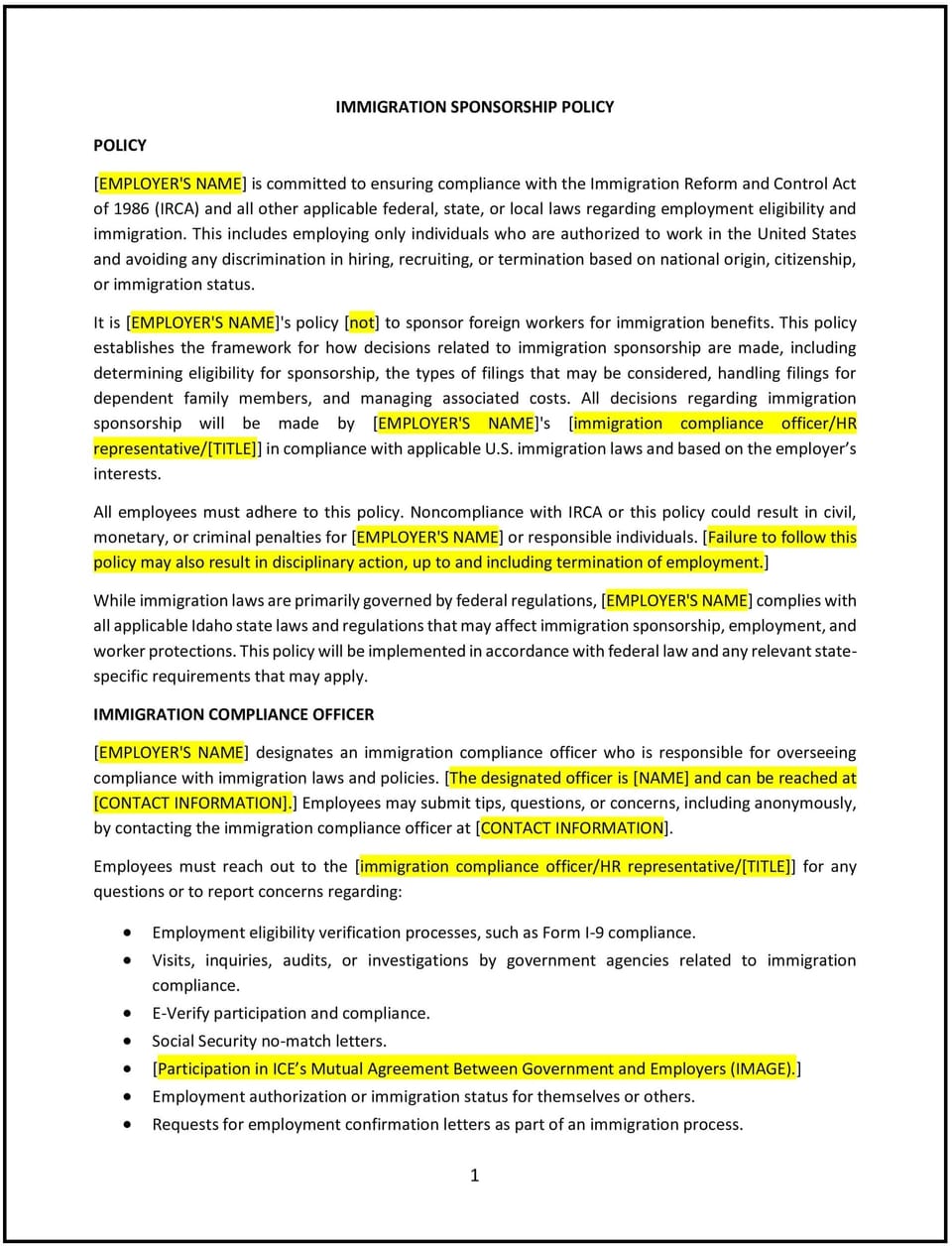Immigration sponsorship policy (Idaho): Free template

Immigration sponsorship policy (Idaho)
An immigration sponsorship policy helps Idaho businesses establish guidelines for sponsoring foreign workers for employment-based visas or permanent residency. This policy outlines the business’s approach to immigration sponsorship, including eligibility criteria, sponsorship processes, and responsibilities for both the employer and employee. It reflects the business’s commitment to attracting global talent while adhering to federal immigration laws.
By implementing this policy, businesses can streamline sponsorship processes, support international employees, and maintain compliance with immigration regulations.
How to use this immigration sponsorship policy (Idaho)
- Define sponsorship types: Specify the types of visas or residency statuses the business is willing to sponsor, such as H-1B, L-1, or green cards.
- Establish eligibility criteria: Outline the requirements for employees to qualify for sponsorship, such as job role, skills, and performance.
- Outline sponsorship process: Provide a step-by-step guide for initiating and managing sponsorship, including legal requirements, timelines, and costs.
- Assign responsibilities: Clarify the roles and responsibilities of the business, the employee, and any external legal counsel involved in the sponsorship process.
- Address costs: Specify which costs associated with sponsorship will be covered by the business and which will be the employee’s responsibility.
- Communicate expectations: Ensure employees understand the terms of sponsorship, including any commitments or obligations they must fulfill.
- Review and update: Regularly review the policy to ensure it remains aligned with federal immigration laws, business needs, and employee expectations.
Benefits of using this immigration sponsorship policy (Idaho)
This policy provides numerous benefits for Idaho businesses:
- Attracts global talent: Sponsorship enables businesses to recruit and retain skilled international workers, enhancing their workforce.
- Supports diversity: The policy fosters a diverse and inclusive workplace by welcoming employees from different cultural and professional backgrounds.
- Provides clarity: A well-defined policy ensures consistent handling of sponsorship requests and reduces potential misunderstandings.
- Encourages accountability: The policy holds both the business and employees accountable for fulfilling their roles in the sponsorship process.
- Aligns with legal standards: The policy helps businesses adhere to federal immigration laws and avoid potential legal issues.
- Enhances reputation: Demonstrating a commitment to supporting international employees can improve the business’s reputation among job seekers and stakeholders.
- Streamlines processes: Clear guidelines for sponsorship help businesses manage the process efficiently and effectively.
Tips for using this immigration sponsorship policy (Idaho)
- Communicate the policy effectively: Share the policy with employees during onboarding, training sessions, and through internal communications to ensure awareness.
- Train HR and managers: Provide training on the policy, sponsorship processes, and legal requirements to ensure proper implementation.
- Partner with legal experts: Work with immigration attorneys or consultants to ensure the sponsorship process complies with federal laws.
- Document sponsorship cases: Maintain records of sponsorship requests, approvals, and outcomes to ensure transparency and accountability.
- Monitor timelines: Track the progress of sponsorship applications to ensure timely submission and approval.
- Review the policy regularly: Update the policy as needed to reflect changes in federal immigration laws, business needs, or employee expectations.
- Lead by example: Encourage leadership to model a commitment to diversity and inclusion by supporting international employees.
Q: Why should Idaho businesses have an immigration sponsorship policy?
A: An immigration sponsorship policy helps businesses attract global talent, support international employees, and align with federal immigration laws.
Q: What types of visas or residency statuses can businesses sponsor?
A: Businesses should specify the types of visas or residency statuses they are willing to sponsor, such as H-1B, L-1, or green cards, as outlined in the policy.
Q: Who is eligible for immigration sponsorship?
A: Eligibility typically depends on job role, skills, and performance, as outlined in the policy.
Q: What is the process for initiating sponsorship?
A: The policy should outline the steps for initiating and managing sponsorship, including legal requirements, timelines, and costs.
Q: What costs are associated with immigration sponsorship?
A: The policy should specify which costs will be covered by the business and which will be the employee’s responsibility.
Q: What are the employee’s responsibilities during the sponsorship process?
A: Employees should fulfill any commitments or obligations outlined in the policy, such as providing required documentation or attending interviews.
Q: How often should the policy be reviewed?
A: The policy should be reviewed annually or as needed to reflect changes in federal immigration laws, business needs, or employee expectations.
This article contains general legal information and does not contain legal advice. Cobrief is not a law firm or a substitute for an attorney or law firm. The law is complex and changes often. For legal advice, please ask a lawyer.


